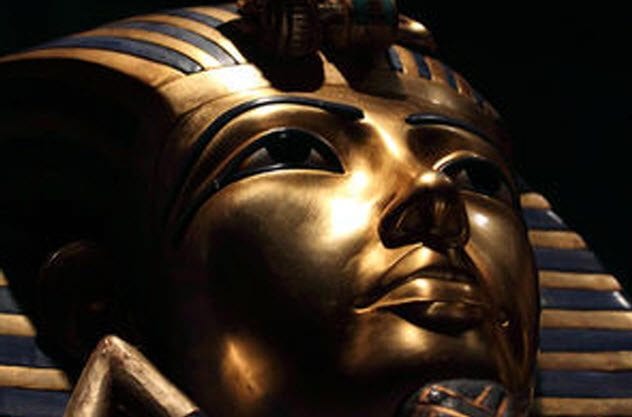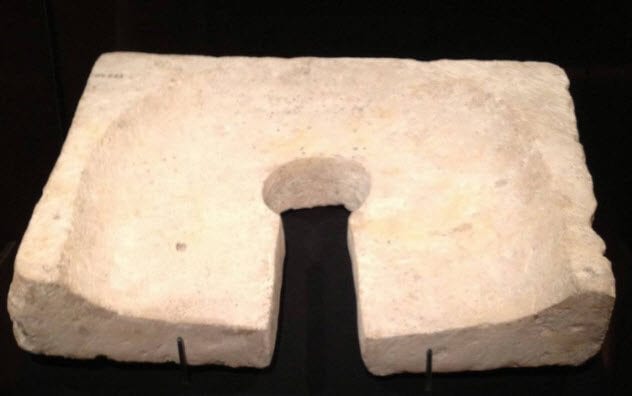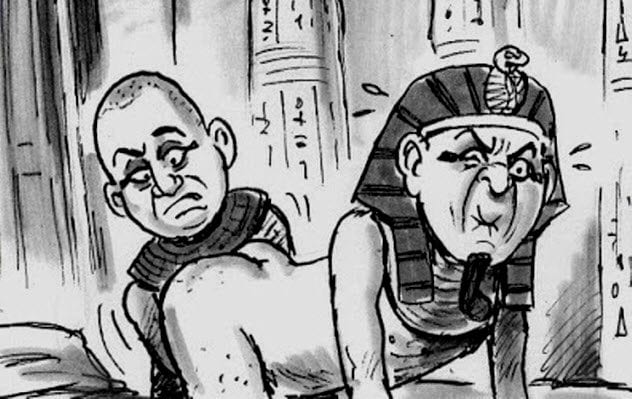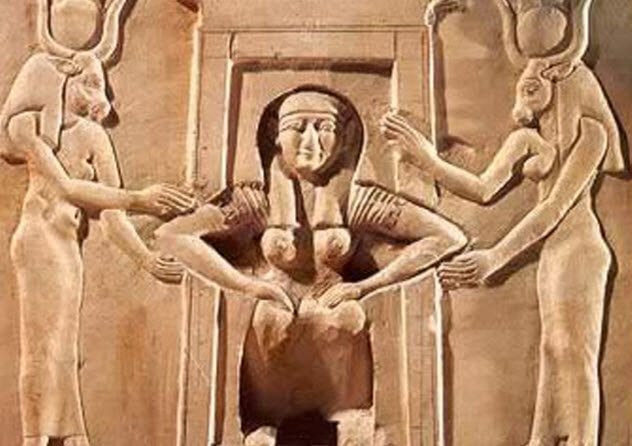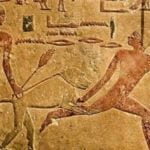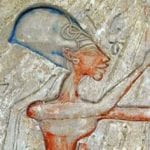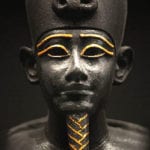10 Lice Was So Bad That People Just Gave Up On Hair
Most people shaved their heads in ancient Egypt. We know this from pictures and from records written by people in other countries who looked at Egypt’s fashion choices and puzzled over why Egyptians thought going bald was such a good look. Today, though, historians are pretty sure they know why. Lice were everywhere in ancient Egypt. The tombs of Egyptian rulers are infested with lice, apparently flooding out from the remains of the bodies. The ancient Egyptians had lice remedies, but they either didn’t work or weren’t worth the hassle. Most people got so fed up with the nationwide infestation that both men and women shaved every hair clean off their bodies. Women usually wore wigs—hair that could be discarded when it got infested—while some others just went around completely shaved from head to toe.
9 Egyptian Women Were Regularly Flashed By Men In Passing Boats
Catcalling isn’t a new invention. Women today might get frustrated when a man whistles or yells out a lewd comment, but that’s nothing compared to what women in ancient Egypt endured. The Greek historian Herodotus watched Egyptians get together for a religious festival. Men gathered their families together into boats and sailed toward the city of Bubastis for a deeply spiritual and sacred ceremony. But going to a sacred ceremony didn’t stop men from flashing girls on the way. According to Herodotus, the men would “cry aloud and jeer at the women” and “pull up their garments” as they passed through the towns. Apparently, the men held onto that distant hope that a girl might get so excited that she’d jump into the water and swim after them.
8 King Tut Was Buried Erect
When Howard Carter found the untouched tomb of King Tutankhamen, he discovered a wealth of treasures and relics the likes of which historians had never seen before. The world was abuzz with writings of every single thing found in there—except for one little detail that usually gets left out. King Tut’s mummy was buried with an erection. Nobody knows exactly why, but Tut’s the only Egyptian ruler we’ve found so far who insisted on being mummified with a raging hard-on. There are a lot of theories, some crazier than others. According to one theory, the erection might not really be his. Some people think that his embalmers switched his real member with that of a more impressive donor.
7 Egyptian Birth Control Was Disgusting
The Egyptians had their own ways of practicing planned parenting. For the time, these were amazing innovations that show the ancient Egyptians had an incredible interest in and understanding of medicine. But that doesn’t mean these methods weren’t horribly disgusting. Women had a few options for birth control, including different mixtures for contraceptives. Some of the nicer ones involved honey, but the braver women mixed tree leaves and crocodile dung. Then the woman had to stick that concoction inside herself—or else deal with nine months of pregnancy. Men weren’t off the hook, though. They had male contraceptives that weren’t much better. Men had to rub onion juice onto their foreskins to keep themselves from having kids. It’s not clear how many people actually used these contraceptives. But given the choice, the ancient Egyptians had a strong argument for staying celibate.
6 Beautiful Women Were Left to Decay To Stop Necrophilia
When a man died in Egypt, he was embalmed right away. Women, though, were a different matter. By law, the beautiful and the powerful weren’t sent to embalmers until they had decayed for three or four days. This was because Egyptians didn’t trust the embalmers to keep their hands to themselves. This wasn’t just paranoia. It was something that the Egyptians learned the hard way. An embalmer left in charge of mummifying a royal body was caught in the act by a coworker. The coworker ratted him out, and the Egyptians learned from their mistakes. After that, Egyptian rulers didn’t even trust their workers with dead women.
5 The Pharaohs Were Horribly Obese
Most drawings of pharaohs show them as thin, muscular people, but that couldn’t be further from the truth. The pharaohs ordered their artists to make them look pretty, but the real bodies we’ve found left behind tell a different story. Most members of the Egyptian royalty were massively overweight. Egyptian rulers had terrible diets. Their priests were ordered to prepare three banquets each day, all overflowing with wine, beef, and cake. They scarfed down food filled with saturated fats all day. Mummies have been found with clogged arteries, bulging bellies, and massive fat folds. Obesity was a reality for Egyptian pharaohs. They were so familiar with it that the Egyptians were already writing medical texts on the dangers of obesity as early as 1500 BC.
4 The Egyptians Took Laxatives Three Times A Month
Egyptian royals were very concerned about overeating. They might have been fat, but that didn’t mean they wanted to be. Slim, muscular frames were still the beauty standard for Egyptian men. So they did what they had to do to keep themselves healthy. Most Egyptians would take laxatives three days each month. They used a laxative made of castor oil and then got ready to spend the rest of the day on the toilet. This was before plumbing, of course, so that meant they had to clean up their mess by hand afterward. There wasn’t a problem that they couldn’t fix with laxatives. Even diarrhea was treated with laxatives. Apparently, the idea was to get the disease out of their bodies by force and get through the whole mess as quickly as possible.
3 Egyptian Proctologists Were Called ‘Shepherds of the Anus’
Medicine was a major part of ancient Egyptian culture, and they made some incredible advances for their time. Like we do today, ancient Egyptians had doctors for every body part of the body. They had dentists for their teeth, optometrists for their eyes, and of course, proctologists for their backsides. Or, to translate the Egyptian word for “proctologists” literally, “shepherds of the anus.” Proctology had only come so far at the time, so the job of a shepherd of the anus mostly consisted of giving people enemas. Proctologists were specialists who knew exactly how to concoct and administer medications that go up the buttocks and who didn’t really do anything else with their time. The Egyptians were proud of their enemas. They even had a whole myth behind them. Enemas, they believed, were developed by the god of Thoth and then passed on to man—making Thoth a sort of Prometheus of the anus.
2 Egyptian Fertility Tests Were Disgusting
Egyptians had a whole medical system for giving birth. They had ways to test fertility and pregnancy that were truly advanced for their time—and incredibly weird. To test fertility, some doctors would rub oil all over a woman’s body and tell her to lie down until the morning. If she looked “fresh and good,” they ruled that she was fertile. If she didn’t, they said she wasn’t fertile. Others did something a bit weirder. A doctor would put a clove of garlic or an onion inside a woman’s vagina. In the morning, he’d smell her breath. Ancient Egyptians believed that every orifice in a woman’s body was linked and that their mouths had tubes that went all the way down. If the doctor could smell the garlic, then the tubes were clear and the woman was fertile. But if the doctor couldn’t smell garlic, the tubes were blocked and the woman couldn’t give birth.
1 The Ancient Egyptians Believed That Men Menstruated
Ancient Egypt was plagued with diseases. In particular, schistosomiasis infected nearly everyone there. It’s an illness that makes people feel sick and causes blood in the urine and stool. It was so common that they didn’t even realize it was a disease. Ancient Egyptians got schistosomiasis so often that they just thought they were menstruating. They accepted that men had to menstruate just like women, and they accepted the blood coming out of their bodies as a normal part of growing up. Peeing blood was even treated as a bit of a good thing. They believed that a man who menstruated was fertile. To the Egyptians, there was no better sign that a man was ready to father a family than being infected with parasitic worms. Read More: Wordpress


